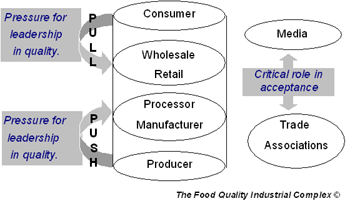QA Program
Quality assurance and food safety have become the number one concern among consumers. Repeatedly consumers read or hear about new foodborne illnesses that have caused sickness and death. Food incidences in recent years have resulted in not only processors being forced out of business or realizing tremendous financial loss but loss of consumer confidence and product/brand identity. Furthermore, the results of foodborne illnesses have forced many consumers to seek other food alternatives, leading to decreased sales throughout the food processing, retail, and foodservice channels, negatively impacting the entire food value chain.
 ReQuest’s objective in developing any Quality Assurance Program is to
minimize the risk of outbreaks while, at the same time, build a platform
for value added products. In return, consumer confidence will increase for
perishable food products and sales and consumption of perishable food
products will increase in both the short and long term.
ReQuest’s objective in developing any Quality Assurance Program is to
minimize the risk of outbreaks while, at the same time, build a platform
for value added products. In return, consumer confidence will increase for
perishable food products and sales and consumption of perishable food
products will increase in both the short and long term.As with any ReQuest business solution, a Quality Assurance Program must also follow the same principles – the solution needs to either lower transaction costs or generate extra revenues. In the case of a Quality Assurance Program, both targets can and should be realized.
- Lower transaction costs: based on its knowledge and experience in
gathering and analyzing processes and data, ReQuest can identify and develop
financial indicators. At ReQuest we refer to these indicators as Financial
Analysis Critical Control Points (FACCP™). FACCP™ is used to segment points
along the Food Value Chain. Based on a thorough analysis of the process, data
points for improvement and financial gain are identified and put in place.
This can tackle huge issues such as shrinkage, loss and waste perishable products.
- Generate extra revenues: having a Quality Assurance Program in place allows for
branding and product differentiation opportunities. Developing new products to meet
the demands of consumers will have a significant impact on sales and consumption of
perishable food products (i.e. meats, dairy, poultry/eggs and seafood in particular).
At ReQuest we have developed Data Exchange Interfaces (D.E.I.) technology to link the various data sources in the value chain. Instead of spending a lot of resources on developing new platforms with various users and authorization levels, these allow the various users to have access to the information they are entitled. The advantages are:
- Low overhead because data is shared on the same platform.
- Availability of data on an as needed basis.
- Capability to track product through the supply chain.
- Opportunity to optimize the logistical and warehouse process.
- Opportunity to realize financial gains through the FACCP™ procedure.